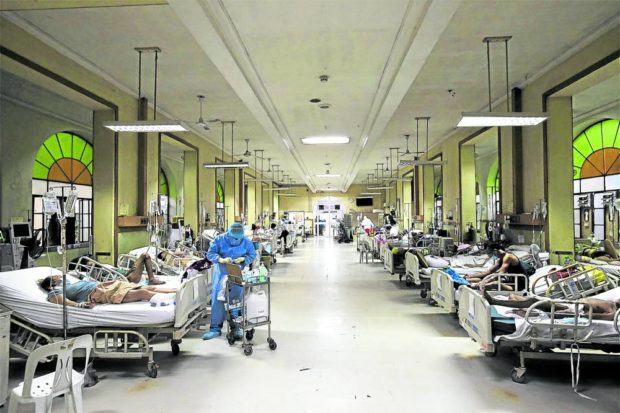DOH orders hospitals to reopen COVID-19 wards

FILE PHOTO: The COVID-19 ward at the Philippine General Hospital. INQUIRER FILES
MANILA, Philippines — The Department of Health (DOH) has directed hospitals to reopen wards and add beds for COVID-19 patients to prepare the country’s healthcare sector in the event of a pandemic resurgence.
According to DOH officer in charge Maria Rosario Vergeire, hospitals were told to follow the “accordion principle” by expanding bed capacity for COVID-19 cases in response to the spike in infections over the past weeks, to prevent a strain on resources and facilities.
She, however, noted that such “reserve” beds dedicated to COVID-19 patients were just on standby, and “not all have been used.”
“Since we saw an increasing trend, we’ve mobilized our hospitals and announced an accordion principle, [wherein] they need to open wards previously reserved for COVID-19 and were later closed to make way for other [cases],” Vergeire told a press briefing.
The health official added that while COVID-19 hospitalizations remained manageable, some hospitals were experiencing “moderate to high” admission rates due to a lack of intensive care unit (ICU) and non-ICU beds.
Article continues after this advertisementThe increase in admissions in these hospitals is connected to the “number of beds, and not the increase in [cases],” Vergeire clarified.
Article continues after this advertisementLow bed occupancy
Bed occupancy rates nationwide remain low, with COVID-19 cases making up 15 percent of the allotted ICU beds and 18.1 percent in non-ICU beds, the DOH said.
The call to increase bed capacity came even as the DOH and pandemic advisers maintained they were not endorsing a return of compulsory masking to curb transmission of COVID-19.
On Tuesday, Vergeire said bringing back mask mandates was “unnecessary” and a “knee-jerk” reaction that could adversely impact the economy.
The Inter-Agency Task Force for the Management of Emerging Infectious Diseases (IATF), led by the DOH, is already crafting a “pandemic exit plan” that would be presented to President Marcos.
The latest COVID-19 data from the DOH showed that the daily case average grew by 42 percent last week at 632 infections per day nationwide.
“All areas are on an uptrend, with NCR (National Capital Region) exhibiting the steepest increase,” the health department said in its latest report.
But transmission in Visayas and Mindanao “are starting to slow down,” it added.
On Sunday, the President said the government would need to consider whether another mask mandate was necessary.
“Although the rate of increase is growing, the baseline of where it started is just low, so hopefully we’re still going to be able to [control] it,” he said.
Mr. Marcos also said the government might have to carry out another vaccination drive targeting the younger population.
Unnamed donor
In a related development, the Philippines is expecting to receive 391,920 doses of COVID-19 bivalent vaccines by the end of May after a manufacturer agreed to go ahead with the donation despite the absence of an indemnification clause, according to the DOH.
In a statement on Wednesday, the health department said the donation of Pfizer jabs by an unnamed country would proceed even without clauses on indemnification and immunity from liability in the agreement, the lack of which had hampered the country’s efforts to procure bivalent vaccines.
The donor country has already secured legal requirements, including an emergency use authorization from the Food and Drug Administration, as well as clearance from the Office of the President.
But the DOH said it could not disclose the donor “to prevent possible concerns in coordination.”
On Tuesday, Vergeire said the vaccine manufacturer was finally convinced to waive the indemnification clause it had required to be able to proceed with the donation.
“The manufacturer [required] us to sign in the indemnification clause and immunity from liability. There were discussions with this government and it agreed and was able to convince the manufacturer that we are not going to have this immunity,” she told reporters.
More than one million doses of bivalent vaccines from the COVAX facility were supposed to arrive in early March.
Vergeire revealed that this batch had already been sent to another country after its shipment was deferred as a result of the government’s decision not to extend the declaration of a state of calamity in the Philippines, which had granted the government and manufacturers indemnity and immunity from suit.
“But [COVAX] has committed that once we are already ready with our legal basis, we can still receive the [bivalent vaccines],” she said.
The country’s state of calamity due to the pandemic lapsed on Dec. 31.